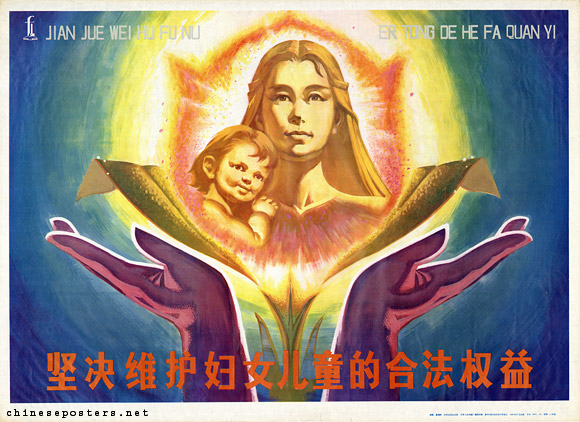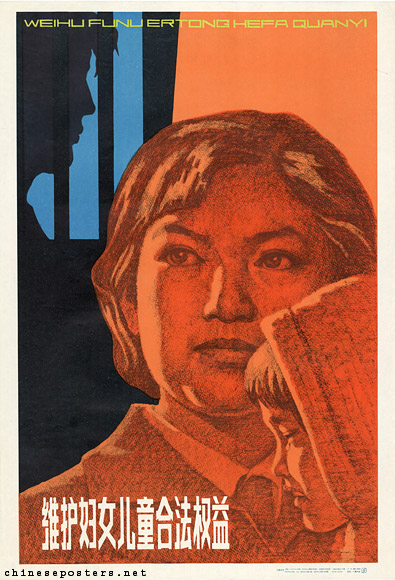Firmly protect the legal rights and interests of women and children, 1983
The more feminine image of women that emerged in the late 1970s tallied well with the general tone of a substantial number of posters produced in the period 1978-1988 that explicitly propagated legal knowledge. These resulted from leadership attempts to formulate a comprehensive body of laws to combat male chauvinism and safeguard the rights - and welfare - of women and children. The reasons behind this campaign were twofold. It seemed on the one hand as if the return to relative normalcy under the reform program had rekindled the political interest in continuing the unfinished work relating the women’s liberation. On the other hand, the economic changes, in particular the decollectivization in the countryside, had resulted in a deterioration of the position of women.
Protect the legal rights and interests of women and children, 1984
Given the attention the Party always had professed to pay to women’s issues, it should be considered remarkable that the protection of the various inalienable rights of women and children suddenly became the subject of such a huge propaganda campaign at all. It threw a startling and discomforting light on the actual situation in which many women apparently still found themselves, and ran counter to the assessment of the social position of women the CCP had given until then.
Despite the fact that such materials gave widespread attention to undesirable phenomena, they did not succeed in eradicating them. On the contrary, the practices of kidnapping women, trafficking in them, selling them off for marriage or into prostitution only seem to have increased. It seems that the government had become well aware of the decreased resonance of posters for the purpose of spreading legal knowledge. Other media, including television documentaries and screenplays allegedly based on real events, provide propaganda countering these activities. When legislation pertaining to women was again reviewed and revised in 1992, no posters were published by the central authorities that presented information about the changes. If they appeared at all, their production was left to the local chapters of the Women’s Federation.
Elaine Jeffreys, "Regulating private affairs in contemporary China: Private investigators and the policing of spousal infidelity", China Information 24:2 (2010), 149–167
Liang Jianzeng (ed.), <Jiaodian fangtan> dang’an 2002 [<Focus> Files 2002] (Beijing: Wenhua yishu chubanshe, 2002) [in Chinese]
Yuezhi Zhao, "The Rich, the Laid-off, and the Criminal in Tabloid Tales: Read All about It!", in Perry Link, Richard P. Madsen & Paul G. Pickowicz (eds), Popular China - Unofficial Culture in a Globalizing Society (Lanham: Rowman & Littlefield Publishers, 2002), 111-135




